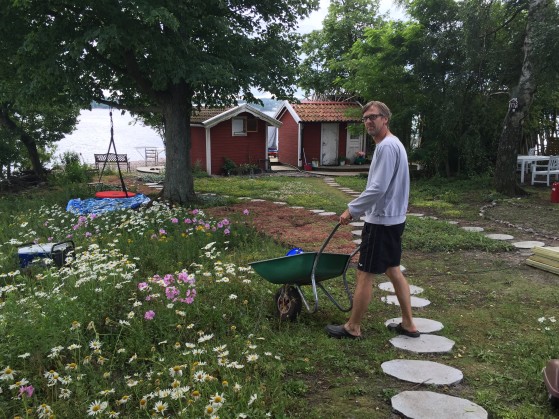Bangkok, Thailand.

I am actually in the middle of a 2-month summer vacation with no speeches, but today, I am making an exception as I am in Bangkok to give a speech.
I flew in from Sweden to this City of Angels one day before my speech to enjoy some great Thai food, some relaxing Thai massage and some refreshing mangoes and young coconuts by the river.
The reason I am taking a break from my vacation is that the client I am speaking for is such an interesting company. Today, I am speaking for the Asian managers of Booking.com.
Booking.com is the worlds largest hotel room booker.
Some awesome statistics about the company:
+700 000 = Number of hotel rooms you can book on the site
+47 000 000 = Number of customer reviews on hotels
+850 000 = Number of hotel nights booked every day (!) through the site
As a person who spends a lot of nights per year in hotels around the world, it is an honor and a privilege to get to speak for this innovative and dynamic company.
So in honor of my client, today’s blog post will be on the theme of hotels.
Over the last 20 years, I have stayed in some awesome hotels. Like The Commune (a hotel over looking the Great Wall of China and consisting of a bunch of over-sized designer villas), or the famous “Ice Hotel” in the north of Sweden that is literally built out of ice and melts every spring.
But my most amazing hotel experience did not happen in a hotel.
I once arrived late at night in Stockholm only to find out that, due to a misunderstanding, there was no hotel room booked for me.
Normally, this would not be a big problem. I would just go online and book myself a room, but Stockholm is one of those cities where there can be zero hotel rooms available when there is a big conference in town.
This was one of those times. It turned out there were 2 (!) rooms available within 1 hour of travel from Stockholm. One was a hotel suite at Grand Hotel for 650 Euro per night. The other room was at “Danderyd Hospital”.
It turns out that the hospital was renting out the rooms in the maternity ward (!) if they had few expecting mothers.
So for one night, I stayed in a room that had a baby crib in it and in the morning, I had the most amazing hotel breakfast I have ever had: eating cheese sandwiches together with a bunch of women who were holding their new-born babies!
Being a speaker, you surely get to experience some really cool things.
Finally, let me end by giving you some insider-tips regarding hotels from a global speaker’s point of view.
1) Do not let the client be too nice to you.
Many times, the client will choose to put you up in the “nicest/best” hotel in town. That is a very nice gesture (from their side) and a very nice perk (from the speaker’s point of view).
But resist it.
I recently did a speech in Chennai where I was booked in a very nice hotel by the client, but it took more than 45 minutes to get there from the airport. And then in the morning, it took 1 hour to get from the hotel to the venue which, ironically, was just next to the airport.
Putting me up in the closest hotel to the venue would have given me almost 2 hours more of relaxing time in the hotel, instead of driving around in crazy Indian traffic.
For a speaker, “proximity” is the biggest luxury of all when it comes to hotels.
2) Let the client book the hotel, but book the flights yourself.
I usually book my flights myself to be able to have a flexible way of getting to and from speeches, but I normally let the client book my hotel.
Why?
a) They usually get a better deal since they have booked many rooms for their conference
b) There is less costs to invoice the client, and less things for you to keep in your head
c) They normally know more about the city than you do so they know which hotels are good
3) Take advantage of the hotel-perks.
In some countries (or I should say some airports), getting a taxi can be a nightmare. I have had some awful waiting-in-line-for-taxis-for-over-one-hour-experiences in, for example, Shanghai and Brussels.
If the client is ok with it, ask them to book a hotel car pick-up so that there is someone waiting for you with a sign carrying your name on it as you exit the airport, and you will be on your way to the hotel a few minutes after landing.
If possible, try to get the mobile phone number of the driver as airport pick-up is a great service that can turn into a very annoying service if the guy there to pick you up is not there when you come out.
4) Try to get the client to book you in the same hotel where the conference will be held.
Many conferences take place in hotel ballrooms, or in conference centers that has a hotel in or next to it.
But many times, the delegates for the conference will stay in many different hotels around town since not all delegates might fit in the hotel where the conference is happening.
As a speaker, you should kindly suggest that you get a room in the hotel where the conference takes place, so that you can:
a) easily check out the speaking venue when you arrive
b) can go up to your room if you need
c) do not have to worry about getting from your room to the venue
etc.
It might sound basic that the speaker should stay in the hotel where the conference is, but you would be surprised how often the conference organisers miss this.
But it is easy to forgive them for not thinking of this, since for the person organising the conference, this is just a VERY minor detail amongst millions of other things they have to think about.
But for you, it makes a huge difference.
Make sure you ask for this early so that they do not need to re-book someone else to a different hotel.

